Russian aristocrats against Emperor Paul I. “Conspiracy of the Beneficent”
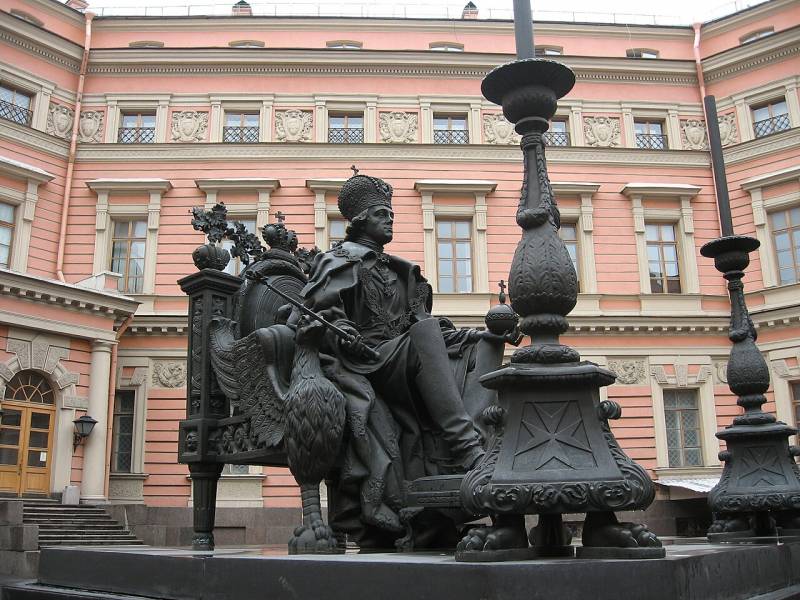
Monument to Paul I in the courtyard of the Mikhailovsky Castle
As we remember from previous articleDuring the few years of his reign, Paul I managed to do a lot of good for the state and the vast majority of his subjects, but at the same time alienated a narrow layer of serf-owning nobles against himself. Particularly dissatisfied were the depraved officers of the guard regiments of St. Petersburg, who suddenly realized that their duties included not only playing cards, dancing at balls and carousing in taverns with gypsies. You must also regularly appear in the barracks and, oh horror, dress according to the regulations, learn to walk in formation and handle the service card. weapons. These quite reasonable demands were quite enough to declare the emperor crazy.
On the other hand, Paul I dared to allow himself an independent foreign policy and challenge the British, who insulted him by refusing to return Malta, which legally belonged to him. And the Russian aristocrats who wanted to lead a “European way of life” were entirely dependent on the British who bought grain from them. There are no foreign exchange earnings from Britain - there is no opportunity to spend money in European capitals, buy luxury goods, furnish mansions with imported furniture, pay salaries to French chefs, Italian musicians, German estate managers, take in foreign actresses, ballerinas and singers for maintenance. Thus, Russian nobles and English bankers and lords had common interests. We remember that the sister of Catherine II’s last favorite, Platon Zubov, Olga, better known by her husband’s surname (Zherebtsova), was the mistress of the English ambassador Charles Whitworth, who in every possible way promoted among Russian aristocrats the idea of removing Emperor Paul I, who was inconvenient and objectionable to Britain, from power with the appointment of a regent. The Zherebtsova-Zubova brothers, who fell into short-term disgrace under Paul I, had already been returned to St. Petersburg, restored to their rights (including property rights) and, not needing anything, led a secular lifestyle. However, they dreamed of restoring their former influence at court, which they hoped to gain under the young and new Emperor Alexander I, who owed everything to them. Olga Zherebtsova-Zubova became a mediator between the British Ambassador Whitworth and the Russian conspirators.
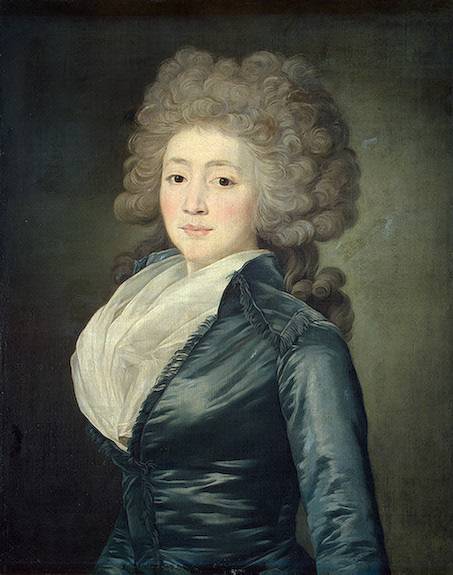
Olga Zherebtsova in the portrait of Jean-Louis Voile
However, the conspirators received a heavy blow after a dispatch was intercepted in which Whitworth called Paul I crazy. This led to his expulsion from St. Petersburg, but the conspiracy had already taken shape and acquired “flesh and blood.” Proof of the English trace in the murder of Paul I is the 2 million rubles that Olga Zherebtsova received in London immediately after the assassination of the emperor. She was supposed to distribute this money among his killers, but she appropriated it, deciding that the conspirators would not dare to openly demand their “30 pieces of silver,” and, of course, none of them would file a complaint in court.
The first conspiracy against Paul I was drawn up back in 1796 in Smolensk; it is sometimes called the “Conspiracy of Amateurs.” The conspirators were led by two retired colonels - A. M. Kakhovsky and P. S. Dekhterev, who gave their organization the strange-sounding name “Canal Workshop”. "Canaglia" literally means "pack of dogs" in Italian. But later they began to call swindlers and swindlers that way. I think you will agree that it is difficult to expect anything serious from an organization with such a name. In 1798, all these “rascals” were arrested, no one was executed - they got off with prison or exile.
Much more dangerous was another conspiracy, organized with the help of the British by the highest dignitaries and aristocrats of the Russian Empire. The “conspiracy of the blessed” began to take shape in the summer of 1799, the denouement came on the night of March 11 (23) to March 12 (24), 1801.
Dramatis personae
In St. Petersburg, the idea of abdicating Paul I from the throne was promoted by Nikita Petrovich Panin, the nephew of the mentor of this emperor (Nikita Ivanovich Panin). Under Paul I he became vice-chancellor at the age of 29.
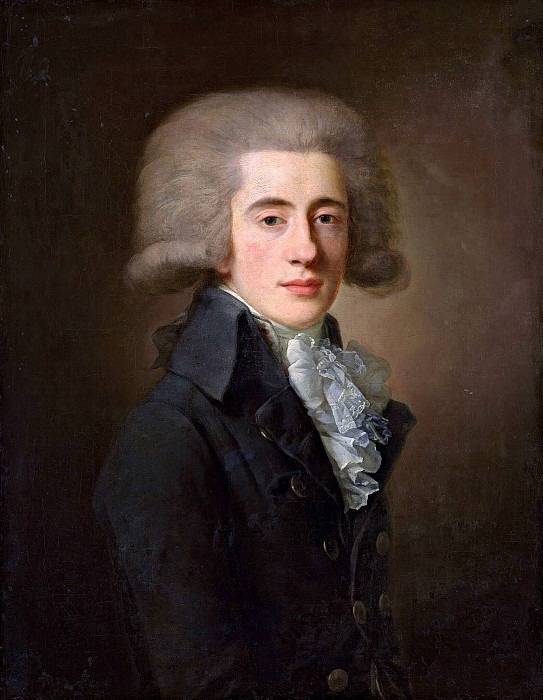
Nikita Petrovich Panin in the portrait of Jean Louis Voile
But Panin was an ardent opponent of the alliance with France. On this basis, he later quarreled with Pavel and was sent to his estate Dugino. Ironically, N. Panin was the only one of the conspirators who really wanted to save the life of Paul I. Alexander, in his opinion, should have become “regent for a mad father».
Before his disgrace, Panin managed to attract Admiral Osip de Ribas to his side.
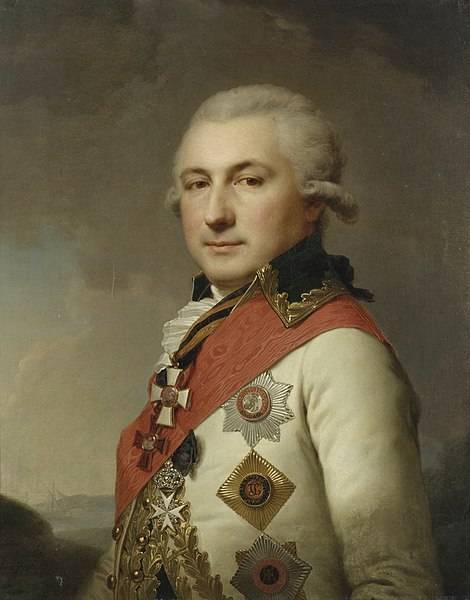
Osip de Ribas in a portrait of Lampi, 1796
The founder of Odessa, Paul I, was initially dismissed from his post as commander of the Black Sea rowing fleet, then returned to service - and again dismissed for numerous abuses in the quartermaster line. De Ribas was more than determined, demanding that a dagger or poison be used against Paul. And suddenly he was appointed acting minister of the sea, which obviously made him very happy. But the conspirators were frightened by this appointment - they now feared betrayal on the part of the admiral. And therefore there were rumors that the sudden death of de Ribas was caused by poisoning. They even named the name of the alleged poisoner - he was allegedly the Governor-General of St. Petersburg, Count Pyotr Alekseevich von der Palen, who joined the conspiracy. It was he who was at the bedside of the ill de Ribas on the night of his death.
Palen came from the family of one of the Courland barons. He fought with the Turks, including near Bendery (where he was wounded), and near Ochakov, and in 1791 he negotiated peace with the Swedes. Having been appointed ruler of the Riga viceroyalty and governor-general of Courland, he incurred the wrath of Paul I by providing a royal reception to the disgraced Platon Zubov, who was heading abroad (in fact, honors were due to the former king of the Polish-Lithuanian Commonwealth Stanislav Poniatovsky, but he passed by Riga). However, soon Paul not only returned Palen to service, but also literally showered him with favors - he appointed him governor-general of St. Petersburg, inspector of six military colleges, director of posts, member of the board of foreign affairs and chancellor of the Order of Malta. However, he apparently remained resentful of the emperor.
Palen was 55 years old at this time, but he still retained vigor in both body and spirit, and had the appearance of “the most honest and the most fun“, knew how to please people.
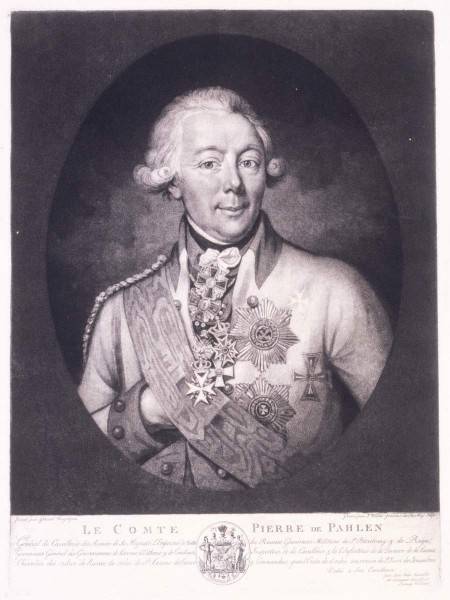
P. A. Palen in the portrait of D. Walker (from the original by G. Kugelgen), 1790s.
Gradually, it was Palen who found himself at the head of the conspiracy. He took on the role of “recruiting” the heir to the throne, Grand Duke Alexander.
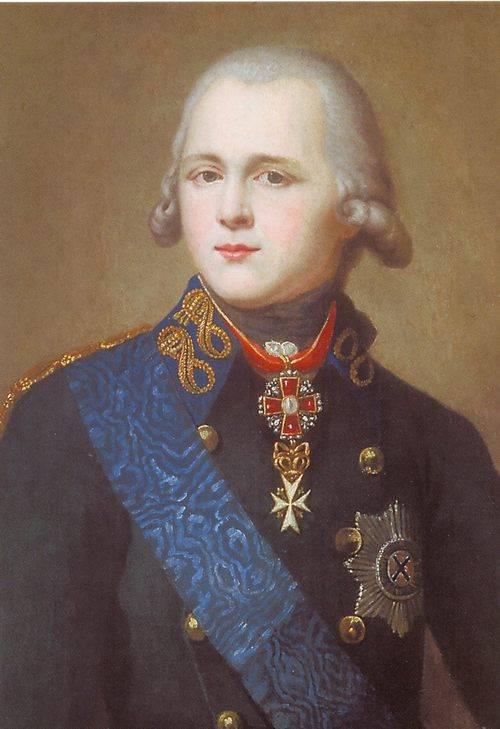
Tsarevich Alexander in a portrait by an unknown artist, 1798-1800.
At first, Alexander was offered to become his father’s co-ruler: supposedly the Senate would be able to convince Paul of the need for such a step, all that was needed was Alexander’s consent to this. The Grand Duke readily “swallowed the bait” and did not inform his father about this conversation. The arrival of Empress Maria Feodorovna's nephew (13-year-old Eugene of Württemberg) in St. Petersburg was used to spread rumors that Paul intended to marry him to his eldest daughter and declare him heir to the throne. They began to frighten Alexander with the wrath of his father, who was allegedly ready to send him, his brother Constantine and his mother-empress to prison.
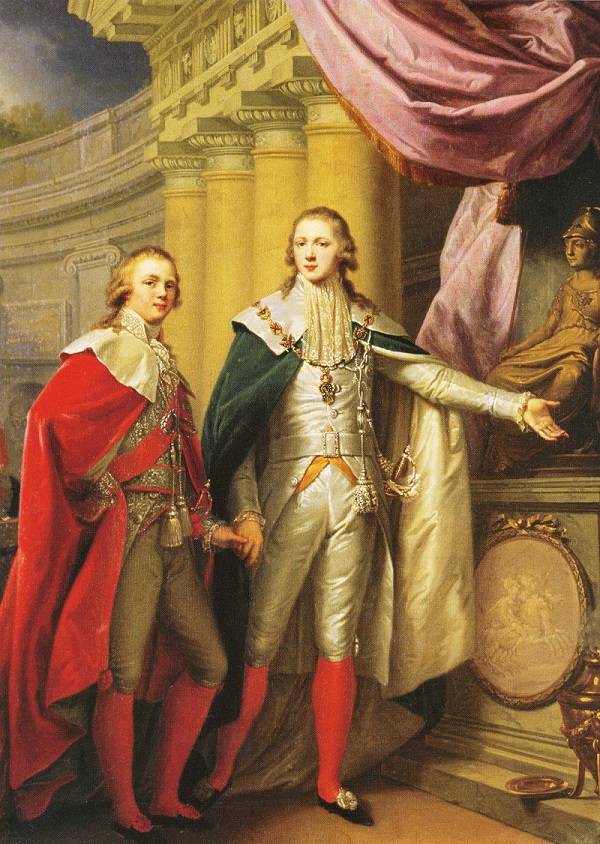
Johann Baptist Lampi the Elder. Grand Dukes Alexander and Constantine. 1795
Palen recalled:
And further:
It seems that Alexander, who knew how the abdication of the throne ended for his grandfather, Peter III, perfectly understood the impossibility of a bloodless coup and “bargained” only for show. The following description by F. F. Rostopchin of relations in the family of Paul I has been preserved:
In general, as Herzen later wrote,
In parallel with the “processing” of the heir, new participants in the conspiracy were recruited - according to the same scheme: Palen confidentially informed the chosen person that a decision had already been made on his arrest or expulsion from the capital. It was difficult not to believe the Governor-General of St. Petersburg and the head of the Secret Police. Meanwhile, Pavel was persuaded to grant amnesty to many of his future murderers, including Bennigsen and the Zubov brothers.
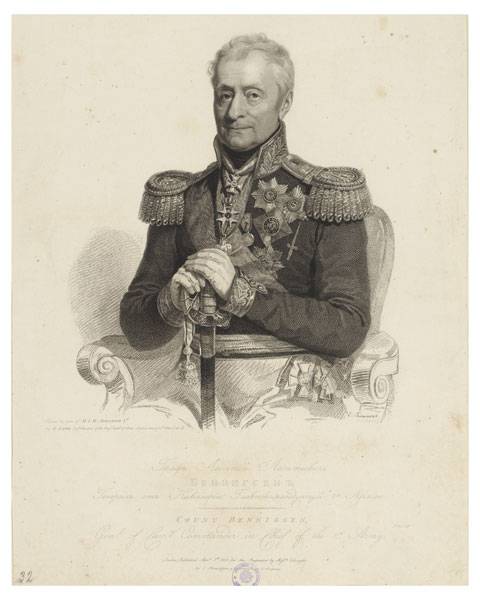
Levin August Gottlieb Theophile von Bennigsen on an engraving by Geitman after the original by J. Doe. In Russia he was called Leonty Leontyevich. A native of Hanover, an English subject in Russian service. He never learned to speak Russian
Leonty Bennigsen and Platon Zubov will become leaders "squad of drunken guards", who on the night of the murder break into the emperor's bedroom. By the way, it was the British envoy Charles Whitworth who gave his mistress Olga Zubova-Zherebtsova money to bribe Kutaisov, who persuaded Paul I to return the Zubovs to St. Petersburg.
On the other hand, Arakcheev, who was unconditionally loyal to the emperor, was removed from St. Petersburg.
Two days before the murder, Pavel directly asked Palen if he knew about the conspiracy. Palen, as you know, claimed that he assured the emperor that he deliberately entered the circle of conspirators in order to be aware of their plans. But General Karl Toll recounted Palen’s story he heard:
Having calmed the emperor, Palen asked permission, in case of emergency, to arrest the empress and the grand dukes. He presented the received order to Alexander. In addition, Palen recommended that Paul nail down the door to the chambers of his empress wife, from where the conspirators allegedly could have broken into his bedroom. Thus, Paul was deprived of the opportunity to seek salvation in his wife’s rooms.
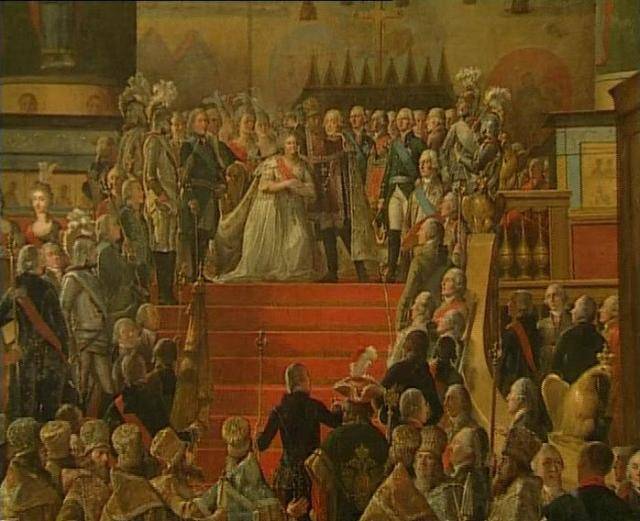
Fragment of the painting “Coronation of Paul I and Maria Feodorovna” by Martin Ferdinand Quadal
Anxious forebodings had long haunted the emperor, who decided to build for himself and his family not a palace, but a castle, named after the heavenly patron of the Romanov dynasty - Archangel Michael (also called the Engineer). Construction was completed at the end of 1800. Pavel managed to settle in the Mikhailovsky Castle. And he was killed 39 days after the move.
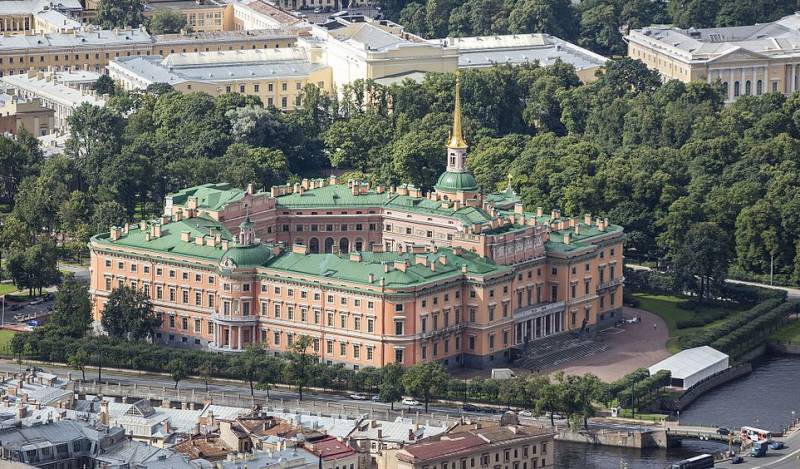
Mikhailovsky Castle
The last day of the life of Paul I
On March 11 (23), 1801, the emperor, as usual, woke up at about 4 o’clock in the morning. He worked in his office until 9 o’clock; among other things, he listened to Palen’s report. Then, together with his son Alexander, he “inspected the troops».
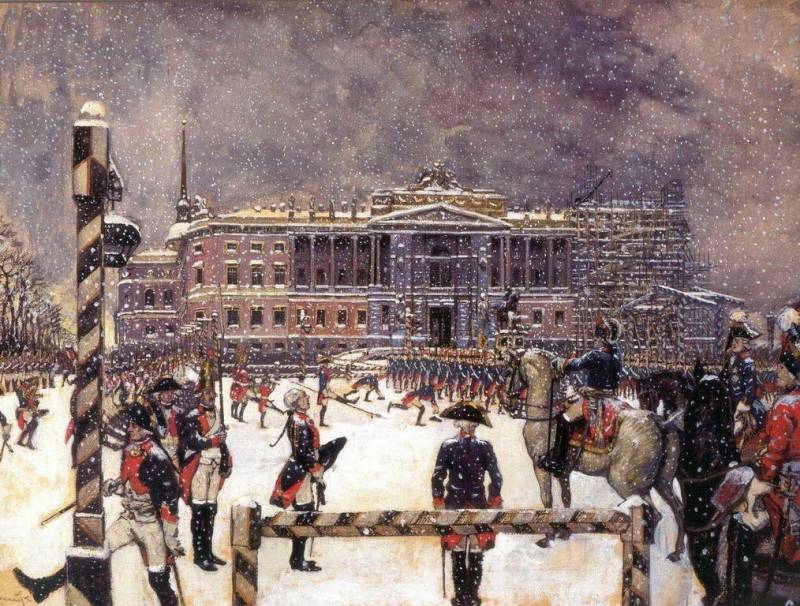
Alexander Benois. "Parade under Paul I"
Palen then gathered the guards officers and, on behalf of the emperor, expressed to them “the sovereign's particular displeasure with their service” and hinted at imminent disgrace, even arrest and exile. This was done so that they would not especially grieve for the murdered emperor.
At about one o'clock in the afternoon, Pavel dined at the Mikhailovsky Castle, and meanwhile Palen sent out invitations to dinner to the people involved in the conspiracy. Between 15 and 17 p.m., Pavel swore in all family members, after which he was in a good mood and invited his sons Alexander and Konstantin to have dinner with him. This last meal took place at 9 pm. Among others, Palen's wife and daughter, as well as General Mikhail Kutuzov, were present. Leaving the dining room, Pavel looked at himself in the mirror and said:
His next phrase is conveyed in different ways. Some recalled that the emperor quietly said:
Others stated that he said:
At about half past ten, the life physician Grivet gave the emperor a lemon-mint tincture, after which the outer doors were closed. And before going to bed, Pavel spent about an hour in the company of his favorite Anna Gagarina. And at this time, the 3rd battalion of the Semenovsky regiment (whose commander was Tsarevich Alexander) was alerted and sent to the Mikhailovsky Castle, where it replaced the Preobrazhensky battalion - under the pretext that Paul I had scheduled a review of their regiment for early morning. The officer commanding the Preobrazhensky soldiers did not dare to disturb the emperor, who had already gone to his bedroom, to clarify the order and ordered his subordinates to surrender their posts.
Meanwhile, Platon Zubov and Leonty Bennigsen came to Palen’s house. Here they saw a large hall filled with a large number of drunken officers - from 40 to 60 people. In the end, only Palen and Bennigsen turned out to be sober. Platon Zubov announced that Tsarevich Alexander sanctioned the removal of Paul I from power - fulfilling the will of Catherine II, who allegedly wanted to transfer the throne to him, but the will was destroyed by Bezborodko. The question arose of what to do with the abdicated emperor, it was then that Palen said:
However, seeing that not everyone present shared his point of view, he feignedly agreed to take Pavel to Shlisselburg.
The next article will talk about the murder of Paul I and the fate of the conspirators.
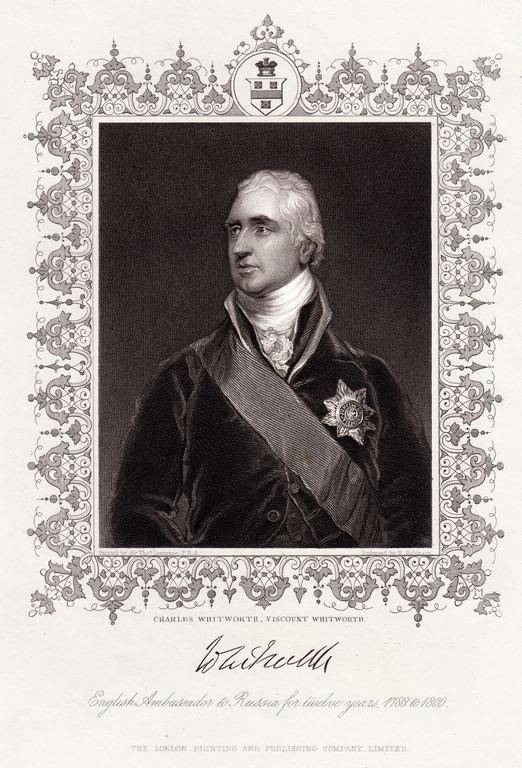
Information